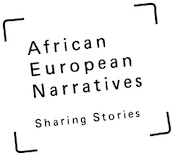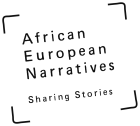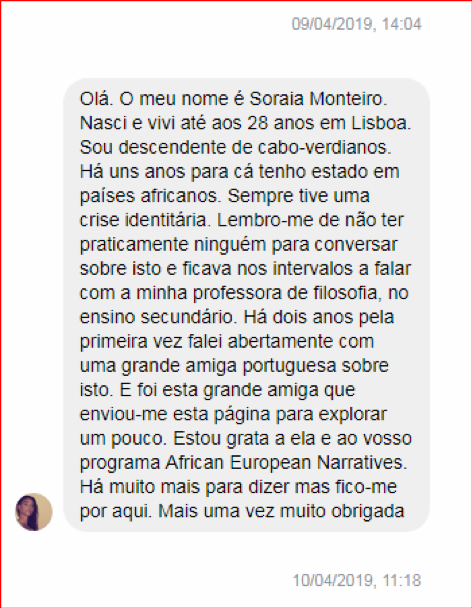Dissemination : Sharing Ideas (Event Description)
Feed Back
to the Afro-European Narratives project
Participants and audiences of the Afro-European Narratives project directly reacted to its activities, proposals and outputs, during events, as well as through the participation and networking tools made available by the project (contributive portal, Facebook and Instagram).
Contact with similar life stories and public discussion of shared cultural, social and political concerns have revealed the importance of deepening cultural dialogue, transnational ties and European citizenship.
Check some of the reactions and feed-back to the activities of project below
_______
FCSH [School of Social Sciences and Humanites] has participated in this project through teachers, researchers, students and the Students Association, – in the full expression of our academic community – and this shows our true commitement to an idea of citizenship that is grounded on diversity.
Francisco Caramelo – Head of the Board of the School of Social Sciences and Humanities of NOVA University of Lisbon
_______
I’m a member of this faculty for almost 30 years and I had never seen so much black people, so many black women, men and young people in this auditorium and that is real symptom
… from my point of view the Portuguese historigraphical community haven’t done their part in terms of their democratic and citizenship contribution
Pedro Cardim – Historian, Member of the Faculty of Social Sciences and Humanities of NOVA University of Lisbon
_______
I’ve been a student for many years at this university and this has been the first time I’ve seen such a diverse audience here, with such a significative presence of black people.
Marta Lança – PhD Student at the School of Social Sciences and Humanities of NOVA University of Lisbon and editor of BUALA – Multidisciplinary Portal on Decolinisation and Global South (link http://buala.org)
About the relevance of the project
About the participation of University Bordeaux-Montaigne in the Project and the impact on students
_______
Discussions are often centered on assimilation and discrimination and not on the more interesting question you are trying to explore in this initiative, which is the one of enrichment.
The fact that the celebrations of the Day of Portugal will also take place in Cabo Verde, constitutes a challenge … so it’s great to be here and maybe take note of a few contributions for that.
The celebrations of Portugal and the Portguese Communities takes place both in Portugal and in a second country, in contact with a Portuguese immigrant community. A few days later, on the 10th June 2019, João Miguel Tavares delivered his speech in Cabo Verde, Mindelo.
[https://www.rtp.pt/noticias/politica/joao-miguel-tavares-defende-maior-inclusao-de-cabo-verdianos_a1153531]
João Miguel Tavares – Journalist and Commissioner of Oficial Celebrations of the Day of Portugal and the Portuguese Communities, 2019
_______
Le sujet nous a beaucoup intéréssée parce que c’est un sujet qui a beaucoup de pertinence sociale – c’est la question du rapport à l’autre, … la question de l’Afrique, … le numérique … et la citoyénneté mondiale.
Les étudiants ont été très récéptifs et très impliqués et on a été surpris parce qu’on a eu des retombées audelà de ce qu’ on attendait. On a senti un engagement vis à vis de l’ Afrique… Après ce projet certains ont envisagé de mener des projets dans le domaine de de ’humanitaire en Afrique .. Un projet est en train de se construire qui va avoir lieu l’année prochain avec les étudiants de notre université.
Alain Kiyindou – Head of the UNESCO Chair Communcaton, Technologies, Développement– Université Bordeaux-Montaigne, Bordeaux (FR)
on the contributive web portal
“.. my story must be one of the few that bears no clear root to African culture or carries part of this continent’s identity legacy. There is, of course, a shared history between these two continents, which I have always observed in the faces of the people surrounding my daily life. It was thus in this daily sharing that I fell in love with the details of this continent.
…
I was an assiduous participant in the various lectures that have shaped this project since January and when I attended the lecture “Memory, Mediation and Imagination” I became aware of my desire to materialize this desire to know Africa“
…
on Facebook
Hello, my name is Soraya Monteiro. I was born and lived up to 28 years in Lisbon, I am of Cape Verdean descent. … I always had an identity crisis. I remember having virtually no one to talk about this… Two years ago, for the first time I spoke openly with a great Portuguese friend about this. And it was this great friend who sent me this page to explore a bit. I am grateful to her and your African-European Narratives program.
…


